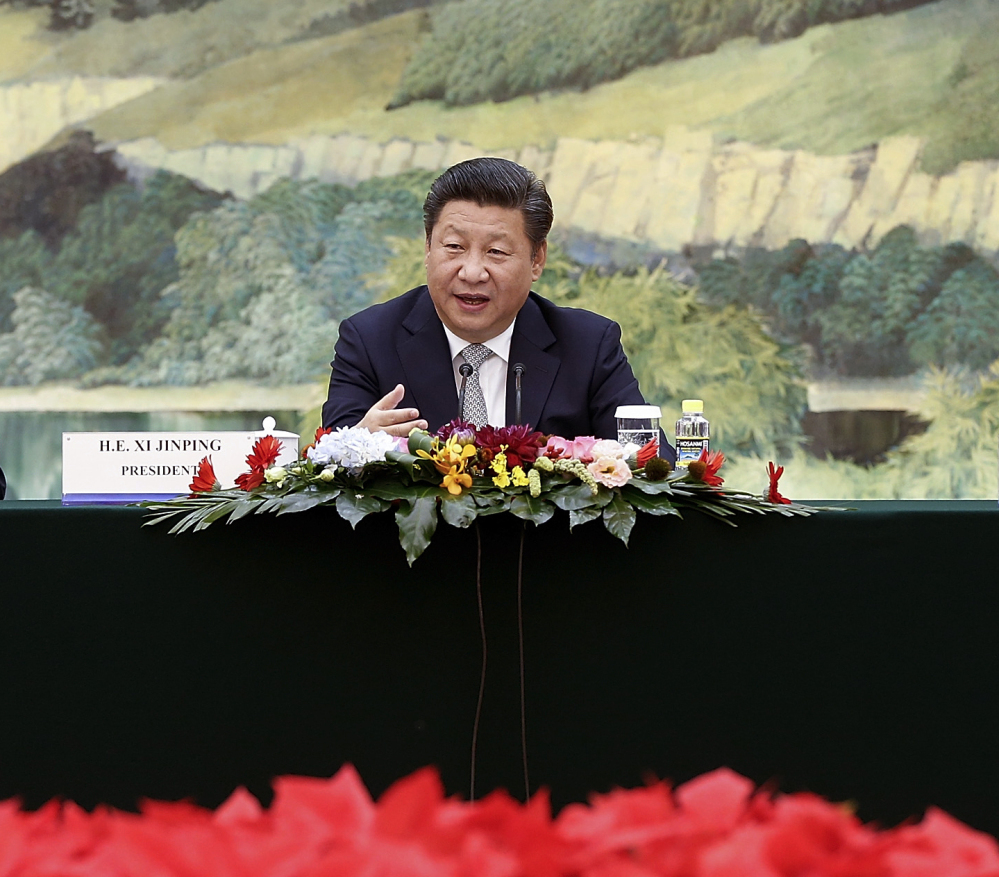BEIJING — He’s been called China’s most all-controlling leader since Chairman Mao, and he is arguably the world’s most powerful current head of state. Yet as Xi Jinping prepares to travel to the United States for a highly choreographed visit, his vulnerabilities – and those of the country he leads – are coming to the fore.
In just the last three months, China’s stock market has tanked, and concerns over the slowing Chinese economy have rocked global markets. Industrial accidents have killed scores of Chinese citizens, including 165 who died in last month’s explosion in Tianjin. Both the stock market crash and the Tianjin tragedy have shaken the faith of Chinese people in their government.
Meanwhile, Xi has launched two separate crackdowns – against corrupt officials and liberal dissenters – that have made him few friends in the state bureaucracy and among China’s educated elite.
“Xi Jinping is feared more than loved,” said Willy Wo-Lap Lam, a Hong Kong-based history professor and author of the 2015 book “Chinese Politics in the Era of Xi Jinping.”
‘TOUGH GUY’ IN FOREIGN AFFAIRS
The Chinese leader, he said, has “struck the pose of a tough guy” in foreign affairs; sidelined his rivals and peppered his speeches with rhetoric about fulfilling “the Chinese Dream.”
“But in terms of real policies to improve the economy, to reduce the gap between rich and poor, he hasn’t done much,” said Lam, an adjunct professor at the Chinese University of Hong Kong.
Xi – pronounced “shee” – is set to make his first U.S. state visit as Chinese president next week, meeting with President Obama on Sept. 25 and then addressing the U.N. General Assembly on Sept. 28. Before traveling to Washington, Xi will meet Sept. 23 with tech and aviation leaders in Seattle and Washington state, which exports more goods to China, in terms of dollar value, than any other.
When Xi last visited the United States, in June 2013, he held informal talks with Obama at the Annenberg retreat in California. Back then, Xi was a largely unknown quantity. Some analysts hoped he might turn out to be a political reformer; others dismissed him as a featherweight. Neither has proved to be true.
In less than three years, Xi has consolidated more power than any Chinese leader since Mao. He’s installed himself on the party’s most important commissions, and his corruption crackdown has proven to be a “two-fer” in further solidifying his position. It has boosted his popularity with the Chinese public while also eliminating potential rivals, such as Zhou Yongkang, China’s former domestic security chief, who lorded over the nation’s oil industry and other state-owned businesses.
At the same time, Xi has attempted to transition China’s economy to a new model – away from reliance on heavy industry and exports to more high-tech manufacturing and service industries. It’s been a fitful transition and could be contributing to China’s unexpected slowdown. But many economists say China needs to eventually make this shift, and they applaud Xi for attempting it.
‘FRIEND’ OF THE AMERICAN PEOPLE
In the United States, public opinion has soured against China. In 2011, before Xi took the helm of the Chinese Communist Party, 51 percent of those surveyed in the United States had favorable attitudes toward China. By this year, those numbers had dropped to 38 percent, according a survey released this month by the Pew Research Center.
Despite such findings – or possibly because of them – Xi likes to present himself as a friend of the American people. When he was vice president in 2012, he visited the Iowa family who had hosted him in 1985 during a cultural exchange. Over the last week, China’s state-run Xinhua news service has been highlighting “Xi’s friends in the U.S.,” with videos flashing back to Xi’s seven visits to the United States.
During their upcoming summit, Xi and Obama are expected to discuss several hot-button topics, ranging from Chinese concerns over U.S. military assistance to Taiwan and U.S. concerns over cyberspying. While no breakthroughs are anticipated, the two leaders have defied expectations before. In November, when Xi and Obama met last in Beijing, they surprised the world with a bilateral agreement to limit greenhouse gas emissions.
Even if the summit fails to produce much, the fact that it is scheduled is significant in itself.
In the United States, some human rights groups and Republican presidential candidate Scott Walker have urged Obama to cancel the summit.
Send questions/comments to the editors.



Success. Please wait for the page to reload. If the page does not reload within 5 seconds, please refresh the page.
Enter your email and password to access comments.
Hi, to comment on stories you must . This profile is in addition to your subscription and website login.
Already have a commenting profile? .
Invalid username/password.
Please check your email to confirm and complete your registration.
Only subscribers are eligible to post comments. Please subscribe or login first for digital access. Here’s why.
Use the form below to reset your password. When you've submitted your account email, we will send an email with a reset code.